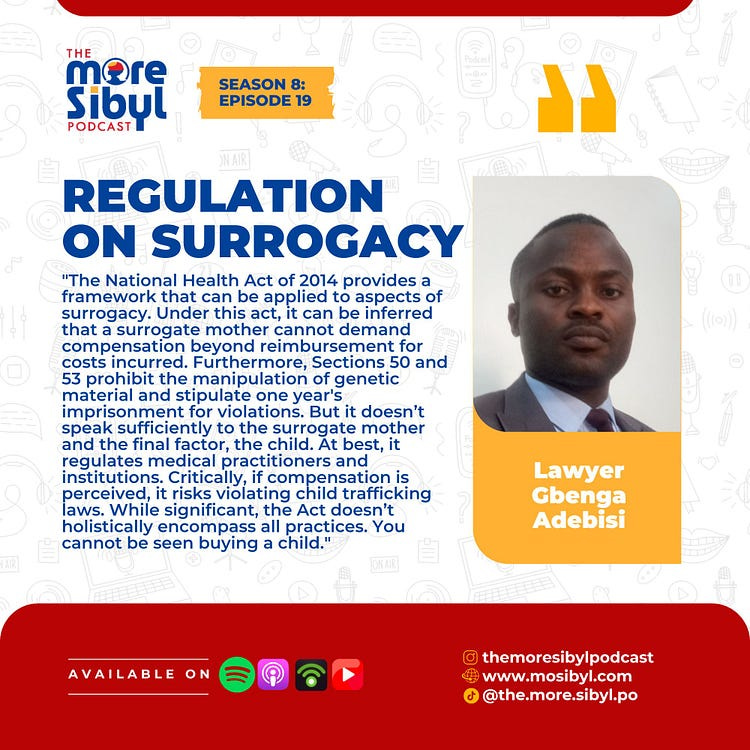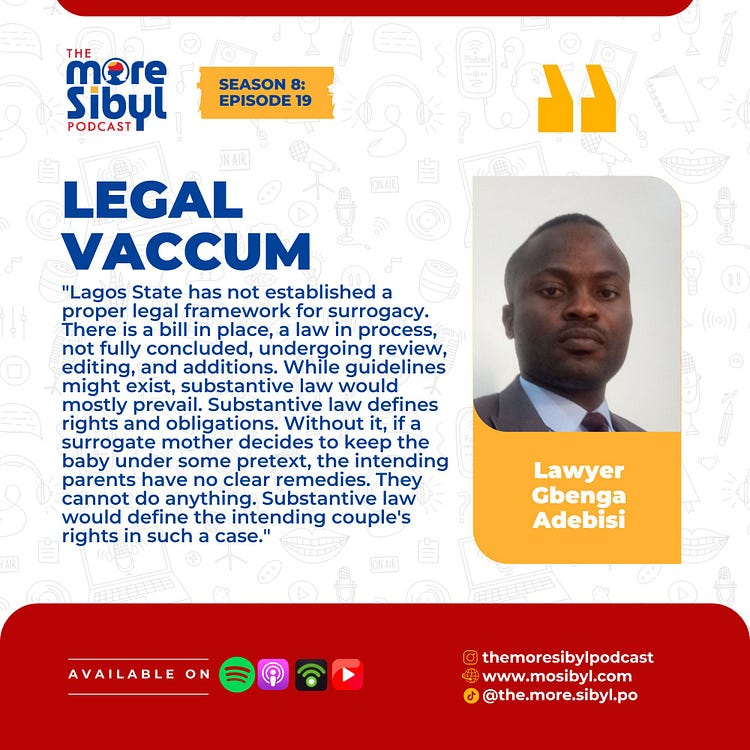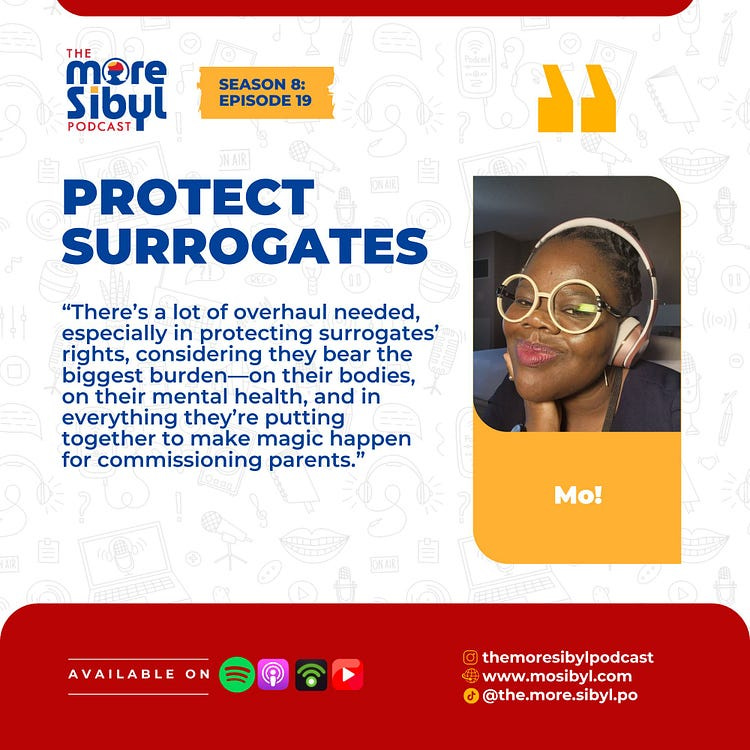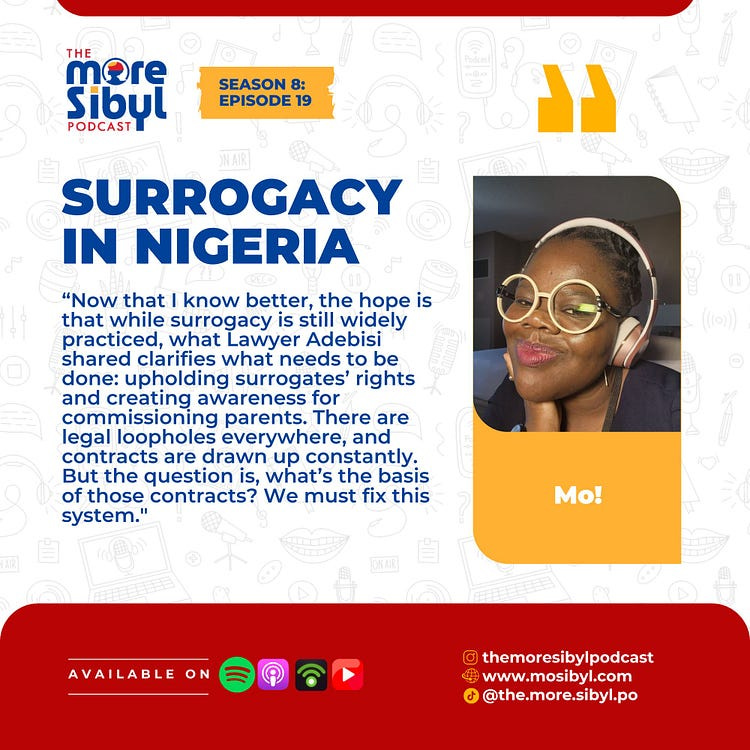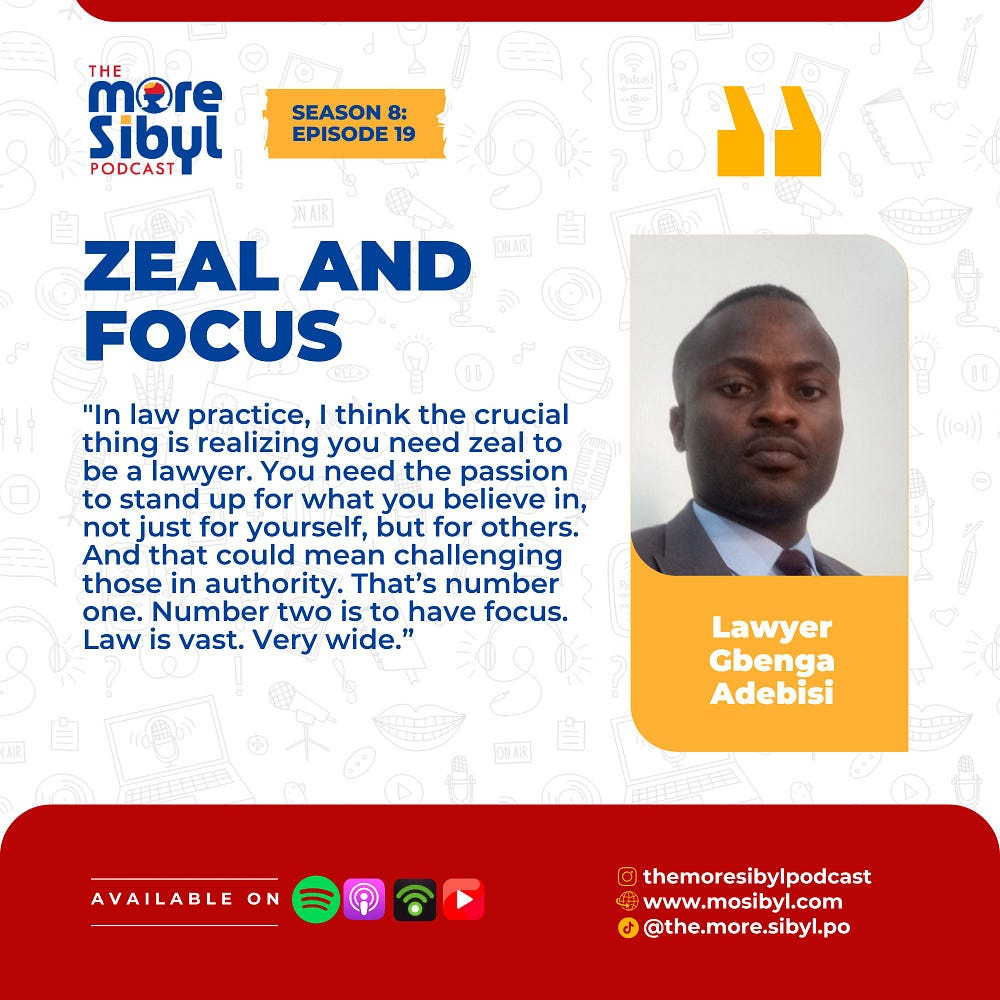DISCLAIMER:
This episode contains heavy themes — a heads-up to anyone who may be emotionally fragile or easily triggered.
“If I were to consider the end goal of surrogacy, which is a surrogate mother conceiving and delivering a baby on behalf of another, then, as of today, it is not legal. It doesn’t matter that some parts of the process are regulated. If the end result is not backed by proper substantive law, then everything falls apart. It is, simply put, illegal.” — Lawyer Adebisi (2025)
We Made It — The Final Episode of Sùúrùgate
We made it! This is the final part of our five-part series on surrogacy, Sùúrùgate! Before diving into this final episode, I'd like to hear from you. What stood out the most? What did you learn about fertility, parenthood, or surrogacy that shifted your perspective? Was it a surprising fact? A personal story that resonated? Or a moment that made you feel seen? Your reflections matter. This might be the end of the series, but I hope it marks the beginning of deeper conversations. We hope these stories serve as lifelines for those navigating similar journeys.
The conversations we've had throughout Sùúrùgate have been deeply emotional, touching on identity, trauma, hope, and healing. But this final episode takes a more technical turn. I'm joined by Lawyer Gbenga Adebisi, who walks us through the legal landscape of surrogacy in Nigeria — a topic that's often overlooked, misunderstood, or hidden in plain sight.
Surrogacy in a Legal Gray Area: Who's Involved, What's Missing
The first thing Mr. Adebisi did was walk us through the legal framework — or, more accurately, the lack thereof — surrounding surrogacy in Nigeria. While many assume it functions under simple contractual agreements between parties, he made it clear that it's far more complicated. Yes, there are medical guidelines that institutions follow. Yes, some laws indirectly regulate parts of the process. However, there is no singular, comprehensive legislation that ties it all together or protects the individuals involved.
He broke it down for us by identifying the key players in any surrogacy arrangement. First, there's the medical institution where procedures are performed. Then, there's the medical practitioner offering expertise and guidance. Next, we have the intended couple, those who are commissioning the surrogacy. Then, of course, the surrogate mother. But Mr. Adebisi added a fifth and often overlooked party: the child.
From the earliest stages — whether it's gametes, embryos, or zygotes — to the birth of a baby, the legal and ethical implications are immense. He emphasized that how the child is defined — whether as tissue, fetus, or whole legal person — has significant consequences for how the law applies to them and, by extension, to the surrogacy process itself.
At every stage, multiple actors are involved, but the law doesn't yet provide a unified framework to govern these interactions. This lack of clarity creates real vulnerabilities — not just for families building through surrogacy, but also for healthcare providers, legal teams, and institutions supporting them. It was an eye-opening moment in our conversation, one that underscored how urgently Nigeria needs a transparent, inclusive, and enforceable legal framework.
Why Surrogacy Still Operates in Legal Shadows
To expand further, Mr. Adebisi offered a simple but powerful definition: "The law is a set of guidelines that regulate human conduct." I had heard that Lagos State might be ahead of the curve, perhaps having implemented legal provisions to govern assisted reproduction, including surrogacy. However, according to Mr. Adebisi, although a proposed bill is under consideration, it hasn't yet matured into a full law. It’s still being reviewed, edited, and revised. So while guidelines exist, there is no substantive law in place.
He helped me understand the difference between guidelines and substantive law. Substantive law is what defines rights, responsibilities, and legal recourse. For example, the Marriage Act outlines the procedures for entering, exiting, and treating children from such unions. That level of clarity is missing in surrogacy. Without it, when something goes wrong — say a surrogate disappears with the child claiming she wants to breastfeed — intended parents have no legal protection or pathway for redress.
The only somewhat relevant legislation is the National Health Act of 2014. Mr. Adebisi read the long title aloud, emphasizing that it provides a framework for regulating health services, institutions, and professionals in Nigeria. It touches on elements of surrogacy, especially regarding medical institutions and processes, but doesn't go far enough.
Under the Act, for example, surrogate mothers cannot legally be compensated beyond reimbursement for expenses like hospital visits or transportation. Any payment beyond that could be interpreted as child trafficking. Furthermore, the Act prohibits unauthorized genetic manipulation, with potential penalties including imprisonment or fines.
Even with these regulations in place, the Act does not adequately address the roles or rights of the surrogate mother or the child. Its focus is primarily on the medical infrastructure and practitioners. At the same time, it provides a partial framework that falls short of the comprehensive protection that surrogacy arrangements require.
Is Surrogacy in Nigeria Legal?
With all this information, I asked the question many people are quietly wondering: Is surrogacy legal in Nigeria?
Mr. Adebisi didn't hesitate. He said plainly, "Surrogacy is illegal in Nigeria."
Why? Because the law does not define or protect the outcome, the handover of a child from a surrogate to intended parents is not protected. Even if elements of the process are partially regulated, the absence of a law covering the result means the entire transaction is vulnerable to criminal interpretation. If money changes hands and a child is transferred, it could legally be construed as child or human trafficking.
He backed this with references to sections of the National Health Act. Section 24 requires medical facilities to disclose all services they offer. Section 27 further requires that federal, state, and private health authorities provide detailed and transparent information on the procedures offered to patients, including their rights, and the duties of care providers. Any clinic offering surrogacy in secret violates these mandates.
While Lagos and other regions have floated bills or taken steps toward regulation, none of these efforts have resulted in enforceable law. Even if some processes fall under general health or civil regulations, the lack of a substantive law covering the entire surrogacy journey renders it not only legally ambiguous but, in practice, illegal.
Contracts and Clinics: Legal Illusions
Many clinics attempt to manage this legal void by drafting contracts — memoranda of understanding that lay out the roles of the surrogate, the commissioning parents, and the clinic. These documents include termination clauses that take effect once the baby is born. But Mr. Adebisi made it clear: you can draft all the contracts you want, but without a law supporting them, they are unenforceable.
He cited Section 13.1.1 of the Health Act, which states that no individual, organization, or clinic may offer health technology services without a certificate of standards. Surrogacy qualifies as such a service, yet many facilities operate without this certification. Whether out of ignorance or negligence, the result is the same: they are operating outside the law."
"Guideline"," Mr. Adebisi said" "cannot substitute for the clarity and authority of la"." Anthat's’s the reality many clinics and families are ignoring. As he put it bluntly" "We have a mountain to clim"."
And he's right.
The House Help Model: A Broken System
What truly hurts me is how poorly surrogates are treated in this broken system. They're often not paid directly. Agencies act as middlemen between hospitals and commissioning parents, and by the time funds reach the surrogates, it’s usually barely enough to cover their basic needs.
I call it the omo odo (house help) model — treating surrogates like they're performing domestic work rather than engaging in a service that demands their body, time, and mental well-being. The process is cloaked in legal ambiguity, but after my conversation with Mr. Gbengait's, it’s clear we've been doing it illegally. There is no law to support the process. No precedent. No legal defense — only silence.
Doing Surrogacy Right: Navigating a Broken System with Caution
While the legal environment remains uncertain, the goal of this episode was to educate and encourage more responsible approaches to the topics. Mr. Adebisi suggested that, if possible, individuals should consider working with a close relative who volunteers as a surrogate. Such arrangements may help avoid accusations of commercialization or trafficking.
He also emphasized the need for structural reform — support groups, advocacy organizations, and reputable medical institutions stepping up to shed light on these issues. He believes we can bring life back to previously abandoned legislative efforts and eventually build a legal system that recognizes and protects everyone involved in surrogacy.
Everything he said resonated deeply. Because the reality is this: surrogate mothers bear the most significant burden — physically, emotionally, and mentally — and yet receive the least recognition or protection. We must do better. Not just legally, but ethically and socially.
Work-Life Boundaries: Drawing the Line
After unpacking the weighty legal content, I went personal. I asked Mr. Adebisi how he balances his demanding career. He said that while he doesn't have traditional hobbies, he has a passion for consuming information, especially world news and politics. But when it comes to boundaries, he’s strict. He never takes his laptop home. He keeps his home life sacred, reserved for his wife and children. He’s learned that the work will always be there. What matters is not letting it consume everything else.
Choosing Your Lane: Advice for Aspiring Lawyers
To young lawyers and students listening, Mr. Adebisi shared some wisdom. First, you need passion — the drive to stand for justice and advocate for others. Law isn't for the faint of heart. It requires courage, focus, and conviction.
Second, he said, choose your niche. The law is too vast to master in every area. Find your lane — be it family law, maritime law, or another specialty — and go deep. He explained that while he has developed expertise in property and shipping law, his interest in surrogacy law stemmed from a client inquiry. From there, he researched the topic extensively, even though he doesn't claim to be a specialist. Humility and a willingness to learn are essential.
He left us with a thought, "In law, an illiterate is not someone who can’t read. It’s someone who doesn't know the body of knowledge in the area they're practicing." That’s why he remains open about what he knows — and what he doesn't.
Learning the Hard Truths About Surrogacy — and Choosing to Do Better
This conversation with Mr. Adebisi shook me to the core. During our first call, before the recording, I was already stunned. It made me reflect deeply. If I had known what I know now, would I have gone through with my surrogacy journey? Maybe not.
That's precisely why I wanted to have this conversation publicly: the truth—even when it's uncomfortable-is what moves us forward. Didn't know better then, but I do now. And I hope this episode gives you the same clarity and resolve.
Nigeria is slowly moving toward legislative reform, and I am optimistic about what the future holds. Until then, we must educate ourselves and others, speak up, and protect the most vulnerable.
If you're considering surrogacy or care about justice, dignity, and ethical healthcare, this episode is for you. Let it inform you. Let it challenge you. Let it move you to advocate for better protections — for every woman, every child, every family navigating this path.
And with that, we bring the Sùúrùgate series to a close. But this is not the end. It’s the beginning of a more informed, more compassionate, and more accountable future.
Massive shoutout to Adeola Kolawole of AAS Law Nigeria for connecting us, because I needed to hear this from a legal professional.
Considering Surrogacy or Global Family-Building?
HOPES (Helping Our People Expand Safely) offers culturally grounded coaching, resources, and community for families navigating surrogacy and CRBA (Consular Report of Birth Abroad). Join our safe and supportive space to receive personalized guidance rooted in lived experience and care. Complete the HOPES Intake Form to get started and receive an invite to our private support group. Note: This is not a legal or medical service — just a compassionate first step toward clarity and empowerment.
🅻🅸🅽🅺🆂:
Download: https://mcdn.podbean.com/mf/web/f2ivirxsdvd9pupk/ADEBISITHELAW2025.mp3
Or on the website: www.mosibyl.com
Join our HOPES: https://forms.gle/o5pbimJr1NQ9oHAY6
Previously on the Suurugate series:




